
Here is an archive of Pedro Argüelles’ recent posts on Translating Cuba.
English Translations of Cubans Writing From the Island

Here is an archive of Pedro Argüelles’ recent posts on Translating Cuba.
I started reading from the last page, where the graphic humor and the occasional caricature of a famous person appeared. I then turned to the crossword puzzle and when I reached the articles, I started to fear that my reading would soon end. I would have to wait another seven days for the seller to shout its name under our windows, a name with distant connotations in pages smelling of ink. My grandparents sought to curb my enthusiasm, saying that the weekly magazine, which they used to buy at the kiosks, was a shadow of its former self.
Bohemia, the oldest magazine in Cuba and in Latin America, was born in 1908 and now it’s the living dead. Though it continues to pile on the years, the fact is that for more than a decade it has ceased to be a reference point. The 1959 Bohemia of Freedom issue, where they showed the bodies massacred by the previous dictator, has been replaced by a boring, triumphalist, insignificant publication. It shrank and lost pages. Its articles repeated the same old sugary stories as the rest of the official press. Even its cover could be confused with those of other magazines, like Sea and Fisheries or the prudish, We’re Young. Its whole personality slipped down the drain of censorship as it was re-educated by a system that doesn’t like uncomfortable magazines nor incisive journalists.
Every day I walk near the building that houses Bohemia, home to the most beautiful of all the busts of José Martí I’ve seen in Havana. I try to explain to my son that dozing there is one of the most important journals once enjoyed in this country and the entire region. For those of his age, that area near the Council of State is simply a place where water collects when it rains, a natural pond that blocks the passage of cars after a shower. “Bohemia Lagoon,” they call it, but I explain that before being known for its floods, in that site beat the heart of the press; there they prepared the pages for eyes like mine to enjoy.

The guilt under the skin, in the air, in a look, in a walk. The guilt that bounces off the guilt of others. The guilt of no one of each one of everyone. His guilt, grandpa’s, the coma’s, the unnameable’s, the reflector’s, the beardedpapa’s… his great guilt.
The guilt for the broken streets, the heat, the sea. The guilt for the nonsense and the olive-green. The guilt for staying, for leaving, for running, for fleeing, for dying. The guilt for the Malecón, the heat, the joy, the grief. The guilt for living, surviving, returning, starting, never ending.
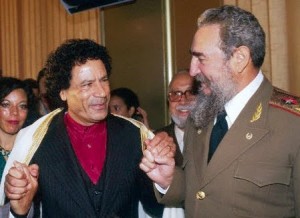
“What’s happening with Cuba, when will they rise up?” a friend from Spain asked me, as she eagerly follows the events that have shaken undemocratic regimes in North Africa. I reply that in our island disturbances can occur, but the government still retains the ability to govern as the opposition is weak and most of the population sleeps in fear, indoctrination and indifference.
According to my friend, thousands of people around the world “await the awakening of the Cubans.” I warn her how risky it is to predict insurgencies within different contexts, but she emphasizes possible comparisons and asks me “to compare the tyrants.” I limit myself to “comparing” the Libyan autocrat his Caribbean counterpart.
It is true, in less than two months riots happened from Tunisia to Yemen, from Egypt to Lebanon. Some despots boarded a plane. It remains to be seen what the Libyan Colonel Muammar Gaddafi will do. In power since 1969, he blames foreign television channels that are “working for the devil,” as if he were God. “I’m not leaving in this situation. I will die as a martyr.”
As the Libyan leader will not follow in the footsteps of Ben Ali and Mubarak, he ordered th protesters to be deterred with helicopters and fighter bombers, while hiring mercenaries and denigrating “the dogs that deliver drugs and money and distort reality.”
“I am not a president, I am the leader of the revolution” warned Gaddafi, as if such leadership turns him into a vital monarch and immunizes him against the changes demanded by the crowds who claim their rights and freedoms in ancient Phoenicia.
Colonel Qaddafi, like comandante Castro in Cuba, justifies its hold on power by blaming all the problems of his country in imperialism. Both are allied to the former Soviet Union and survived its debacle. They go so far as to appoint their heirs: Fidel Castro appointed his brother Raul in mid 2006, while Gaddafi chose his son Saif Islam, who is now trying to appease the opposition.
Gaddafi is as eccentric as his tropical counterpart, but he is pragmatic and has oil. The first came to the throne in 1959, shooting thousands of people, dismantling the Cuban economy and society, arming guerrillas in Latin America and intervening in military conflicts in Africa. The second wanted to become the scourge of Europe and the United States, supported the guerrilla movements who raised the Koran against the West and promoted terrorism by Bin Laden.
The Libyan despot dynamited discos in Berlin dynamited and brought down airplanes in flight. The Cuban tyrant committed similar atrocities, supporting by totalitarian regimes and promoting the mass exodus of the population. Both criminalize political dissent and violate the human rights of their peoples.
The popular uprising in Libya intends to shake up the medieval state restored by Gaddafi in 1969. Opponents want to build a modern, democratic state that promotes freedoms and rights. So far, Gaddafi prefers to “burn it the ground rather than surrender.” The death struggle is being waged in cities across the country.
In Cuba, Castro retains governance, but the powder keg can explode at any moment, but increased unemployment and rising prices of commodities suppress expressions of freedom, as a national despair spreads. The majority sleeps on, focused on survival and indolence, but in this island the carousel of history has always been driven by a bold and enlightened minority; this minority exists. Hopefully it will seize the moment.
March 3 2011
We had not been together on a bunkbed for more than twenty years. My sister preferred to sleep in the lower bunk for fear of falling out in the middle of the night. I, more daring, climbed to the heights of those squeaky bunks at the schools in the countryside. Taking refuge in the fact that I was younger, I jumped on my battered mattress which, with every jolt, threw out a dust cloud of the husks over the recently occupied sheet. My sister complained that I dirtied the pillow with my shoes, muddied from the furrows where we cultivated the tobacco that put us to sleep. With the patience of the elder daughter, she also tolerated that I talked in my sleep all night.
Two decades later we were once again together in a bunkbed, this time without so much as a mat. My sister and I, with one bed up and one bed down in a dark cell at the police station at Infanta and Manglar. We who were once mobilized for agriculture were arrested years later by State Security agents who had also spent nights in those camps at Güira, Alquízar, Los Palacios or Batabanó. A woman next to use asked why we were prisoners as I lay on the plywood of the upper bunk. The stink of the toilet permeated everything and outside, instead of a bell calling us to work, was a grim-faced officer guarding the door.
Memory has certain pitfalls. Now when I recall those hostels full of teenagers they merge in my mind with the image of a cell at the 4th Police Station on the evening of 24 February 2010. My sister and I sharing a can of condensed milk with our classmates, suddenly being thrown into a hallway where the police scream and knock us around. My sister and I, on perpetual bunks, exactly the same amid Pinar del Rio’s red earth as in a damp basement of El Cerro. We went from sheltered girls to arrested women, from Little Pioneers harvesting bananas and oranges, to citizens forcibly pushed into a paddy wagon. My sister and I, one bed above another. She trembles, her voice strained, because she can no longer protect and defend me.
It’s been a year since my sister and I were victims of that arbitrary arrest as we were on our way to sign a book of condolences for the death of Orlando Zapata Tamayo. After filing a complaint with the Military Prosecutor, the Attorney General of the Republic, the National Assembly and the Director of the National Police, I have received no response from any of these institution. Here, once again, is the audio recording I managed to make that day with my mobile phone.
Translator’s note: These videos have no “images” other than the transcript of the words and sounds. Even to the non-Spanish speaker, however, they powerfully transmit the screams, the blows, the voices of Yoani’s sister and others arrested that day as they try to protect her from abuse. An English translation of the transcript can be downloaded here.

Normando, 43, is a hard fighting kind of guy, with a dangerous addiction to risky business. For fourteen years, he’s dedicated himself to building satellite dishes — an illegal job not among the 178 activities authorized by the Cuban government to exercise as self-employment.
A graduate of electronics training, this Habanero might have wished things were some other way. “The reasonable thing is that I would pay taxes and would be authorized to perform my labor legally. But the government doesn’t permit it. So I do it on the sly”.
The house where Normando works at making the dishes is full of drawings of the latest models and books on the subject. On an iron stand, the six most recently finished antennas can be seen, ready to be sold.
The business works; supply exceeds demand. “My parabolics are the best in the underground market in the capital”, he confesses with a twinge of pride. At wholesale, he’s used to selling them for 50 convertible pesos each (60 dollars). Then the buyer resells them at higher prices.
He also does custom work and charges more. The illegal cable television business is one of the most profitable working today in Cuba. In districts like Diez de Octobre, Havana Center, or Old Havana, there are entire blocks hooked up to one illegal antenna, for which each ‘subscriber’ pays 10 convertible pesos a month (some 8 dollars, which may seem little, but in Cuba it’s the equivalent to a monthly employee’s salary).
In Florida, in the United States, live people who want to bring — in a clandestine way — receptor sets and clone cards. Getting dishes by the customs agents in the airports is complicated. Right there is where the “best antenna maker in Havana” appears, according to his particular slogan.
In his spare time, Normando repairs computers and mobile phones, another job that allows him to carry on an unburdened lifestyle, drinking German beer and eating garbanzos with Spanish sausage; all luxuries in 21st Century Cuba — with many risks, of course.
The authorities have busted him a couple of times. “It’s always been by ‘snitching’ (denouncements) from someone envious. They’ve given me fines of 30 thousand pesos (1,500 dollars) which is not a snap, but I’ve been able to pay them”, he tells me, on the terrace of his house.
“I don’t think my job is so dangerous. I don’t sell drugs, nor do I pimp or steal from the government. I think what I do is legal, nobody can prevent anyone from seeing, listening to, or reading what they want. It’s Castro’s big mistake: he wants to sell his version of the news. Perhaps for that I am a public threat,” he points out, convinced.
Normando considers himself a ‘street fighter’. He grew up without parents and always had to look out for his own living. He works hard, but in his own way.
Translated by: JT
March 2 2011
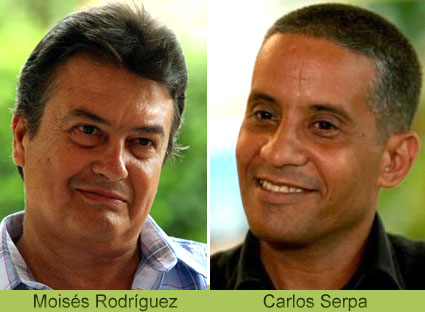 It is, without a doubt, the news-of-the-day for Cuba. It has been news on the Island and off the Island.
It is, without a doubt, the news-of-the-day for Cuba. It has been news on the Island and off the Island.
The new revelation of the identities of Moises Rodriguez and Carlos Serpa Maceira, two State Security agents whom the Cuban government, until Saturday 26 February, infiltrated into opposition groups, is just another case, another grain of sand on the endless beach of similar stories that comprise the daily reality of my country.
Nevertheless, it shakes the ideas, thoughts, reactions, of all those who aren’t already completely undone by this fated and incandescent little island.
I believe that a comprehensive assessment of the material titled The Pawns of the Empire, aired in prime time on Cuban television on February 26, must go beyond skin-deep and quick analysis, so I have broken it into five thematic segments essential to my understanding, for the sake of a deeper and more effective dissection.
1. Who is Telling Us the Story?
One of the primary aspects to fairly weigh the testimony of these two moles, to locate their words on one side or the other of our consciousness, is to clearly define who they were, from the beginning, these people who today are enjoying their fifteen minutes of fame.
We cannot fall into the psychological trap of associating them with the opposition, and then credit them for talking about it with great ownership. We have to remember something: when we hear their testimonies we are not seeing people who were once members of these movements, who distanced themselves and broke with the opposition because their moral precepts went against them.
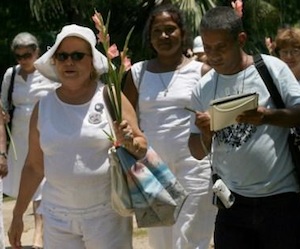 That’s not the case. They were, at all times, agents who, from the very beginning, were enemies of those opponents, men who had one very clear agenda: take notes, look for weaknesses, deficiencies and imperfections as in any human endeavor, whatever they could find.
That’s not the case. They were, at all times, agents who, from the very beginning, were enemies of those opponents, men who had one very clear agenda: take notes, look for weaknesses, deficiencies and imperfections as in any human endeavor, whatever they could find.
But it is vital to understand their statements not as if they formed these negative views from life experience. Moises Rodriguez (the “agent Vladimir”) and Carlos Serpa Maceira (the “agent Emilio”) knew what they would find among the dissidents, what they wanted to find, and nothing human or divine could prevent that from happening.
2. Absolutist Characterizations
According to Moisés Rodríguez, in all his years of links to the counterrevolution he had the pleasure of knowing practically all the dissidents. And he says, “I didn’t know a single one who was truly sincere.” He describes all of them as corrupt, servile, and a long list of other denigrating qualities.
And on this point, the thinking being, the rational man, must stop and look at that statement with suspicion. Why? Because absolutes are very good for campaigns, for thought manipulation, but are never accurate in an assessment.
Equally, I can’t say that all the defenders of the Cuban Revolution are assassins, censors, tyrants, among other things, because I know excellent people, incapable of doing harm to their peers, who approve the process, and the same reasoning is applicable to those who dissent. So it is when one wants to evaluate fairly, without murky intentions, or when one doesn’t have a pre-established agenda.
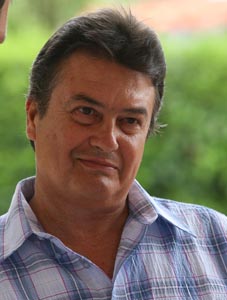 Mr. Moisés didn’t know even one, one dignified example, at least one pearl among so many swine? Then one of two things: either the gentleman didn’t, in fact, know all the dissidents, and he specialized — in some inconceivable way — in contacting the most perverse, or, more likely still: he has no interest in offering a true picture of these people.
Mr. Moisés didn’t know even one, one dignified example, at least one pearl among so many swine? Then one of two things: either the gentleman didn’t, in fact, know all the dissidents, and he specialized — in some inconceivable way — in contacting the most perverse, or, more likely still: he has no interest in offering a true picture of these people.
His intention is to demonize, and for this it’s very simple — and easily detected by us — to generalize without any possible discrimination.
What happens is that, fortunately, we have not all been lobotomized by the system. And we know this art is denied by some who think with their own heads, a healthy exercise that allows us, for example, to admit that it’s true that within the Cuban dissidence there are many despicable people, but (and this is the $64,000 question): How does one accurately assess the role of the opposition given that it fights on massively unequal ground?
What would the Cuban opposition be without the constant infiltration of those agents, without the repression and persecution; if it were allowed to freely organize, speak in the same media that slanders it, or in its own media, and undertake political work legally as happens in most of the countries in the world?
I have my answer: It would be an opposition made up not only of the people with the biggest balls — women included — but of people with the greatest intellect. And I prefer, not intending to harm any friends, the endless number of artists, engineers, accountants, doctors, lawyers, journalists, who would give strength to a more solid and respectable opposition, if dissent in Cuba today was not the purview of lunatics, suicides and martyrs.
3. A Political Endorsement as a Passage to Freedom
One of the denunciations most dangerous to their cause, most contradictory, made by agents Emilio and Vladimir, is this: “Among many there was a desire to accumulate a record as someone politically persecuted, to be able to leave the country.” It also corroborates another of the interviewees: Captain Mariana (unnamed in the documentary).
This, all things considered, subtracts from the brilliance and dignity of the work of the opposition. Is the accusation a lie? It is not. I can testify to this: for too many supposed opponents, defenders of Human Rights in Cuba I have known, their objective is clearly not the democratization of their country, but the ability to flee from it by any means possible. In order to obtain a visa for the United States, they would challenge head-on the reproduction of storks or the Law of Gravity.
In fact, one of the strong points of this documentary in its effort to discredit, is the recording — a flagrant violation of privacy, common in those who can — of Marta Beatriz Roque speaking with Rene Gomez Manzano saying that, because in Pinar del Rio a certain assembly would not be held, then no one would be able to go from there to Miami. And as keeping my mouth shut about what I think is not a cultivated habit for me, I will say that there are few declarations by dissident figures that I find more abhorrent and deplorable than this.
If it’s about a genuine opponent, if Mrs. Marta Beatriz is not “burned” in the future as agent “Juanita,” she does little favor to the beautiful cause of Cuban freedom with her foolish speech and her unpresentable way of defending Cuba.
Nevertheless, let us turn the coin and look at the other side: What kind of country is this where people need to fabricate for themselves a dissident history — sometimes without even having a vocation for it — in order to leave? Who denounces such facts? Their very own agents don’t realize the ridiculous reality of Cuba, where Cubans go to such extremes to escape a prison-like island.
An ironic conclusion for the Cuban oppressors: eliminate the impossibility of traveling freely from Cuba, and surely they will reduce the ranks of the internal enemy.
4. Radio Marti: Sweet Cherry Pastry
One of the passages which generate the most interest, controversy, or entertainment, according to how you look at it, is the false denunciation that the infiltrated Carlos Serpa Maceira makes through Radio Marti, exposing the loose verification of information by that Miami-based radio station.
Now, I admit that carrying out serious and intelligent journalism consists of much more than reporting clandestine information, which is unable to be confirmed. But it’s worth it to look at other angles of the show put on by “Agent Emilio” which was aired before surreptitious cameras.
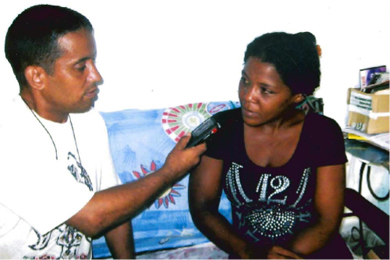 First: it’s impossible, in the literal sense, that any radio station or media outlet in any part of the world can immediately confirm any denunciations coming from our country. The fact that Cuba has squashed all possibilities of free-flowing information, the only options left are to either believe or not believe in those who give their testimonies.
First: it’s impossible, in the literal sense, that any radio station or media outlet in any part of the world can immediately confirm any denunciations coming from our country. The fact that Cuba has squashed all possibilities of free-flowing information, the only options left are to either believe or not believe in those who give their testimonies.
In this particular case, it wasn’t a case of a random source giving a report: It was someone who had an 8-year record reporting about continuous and real arrests, real aggressions against the Ladies in White. Believing in him was not something stupid or idiotic.
5. Finally: Why, and for what?
The underlying question behind this sweet 40 minute audiovisual display is, to my understanding, almost obligatory in the effort to comprehend what has just been shown to us. And it formulates like this:
What is the real objective behind Pawns of the Empire?
To demonstrate the existing ties between Cuban opposition organizations and important political names and structures based in the United States and Europe? To demonstrate to the world, and to Cubans, that the most well-known dissidents within the island, whether it is the Ladies in White, Elizardo Sanchez, or Marta Beatriz Roque, receive financial assistance from the outside? At this point, I think it makes more sense to make a documentary depicting, for example, that we humans are mortal, as opposed to this supposed premise.
Why? Well, because once the Cuban government adjusted its mechanism to only allow official politicians to take part in activism, it condemned those who dared go against them to death by hunger.
So then, what does an opposition leader live off of in Cuba? Who offers them work, and who will contract with them? Even more: politics, just like any other human activity, needs money in order to be carried out. How do you exercise politics in Cuba when absolutely all the opportunities have been closed down so that financing would be considered illegal?
Then, these people with liberation vocations are only left with two options: 1) Acceptance, first to survive and later to engage in politics, with financing that can only come from the outside, and very well camouflaged, or 2) To give up individual freedom and succumb to the imposed laws.
Again, the initial question: What is the objective of Pawns of the Empire?
According to my judgment, it’s as clear as the water: to isolate the opposition from Cuban society, to demonize them publicly, without giving them a chance to respond. And even more, and overall to remind Cubans that the State Security apparatus is one of the ones which will never have any layoffs, and also to remind the people that they better not think of themselves as free to express themselves and free to dissent. Big Brother will always be paying close attention to record phone calls, to film the insides of their houses, to fabricate agents. None of this is impeded by the legal system in the name of sacred individuality.
Translated by Raul G.
March 1 2011
VARGUITAS CONVIVIDO…, originally uploaded by orlando luis pardo lazo.
convivenciacuba.es/content/view/553/51
Translated by Jimmy Rios
March 1 2011
 Watching events unfold in Egypt, I felt envious. The people took to the streets, shouted euphorically and showed the rulers whose hands really hold power. How much I wanted the citizens of my country to interpret that reality! However, to my regret, I feel that the day is very distant when something like this happens in Cuba.
Watching events unfold in Egypt, I felt envious. The people took to the streets, shouted euphorically and showed the rulers whose hands really hold power. How much I wanted the citizens of my country to interpret that reality! However, to my regret, I feel that the day is very distant when something like this happens in Cuba.
Why not do the same? What prevents us from going outside and saying “Enough, this is our path”? Why not protest when they increased the retirement age, cut social spending and continue laying off workers? I wonder.
Why don’t workers go on strike over low wages and rising prices for food, gas and electricity service? Any of these events would lead to social unrest elsewhere in the world. In Cuba no, here come out with placards and loudly support the Revolution. So it seems we are not of this world.
“Work more with less” is the slogan used by leaders, who call us lazy, “kept people” and pigeons. These modern cars riding in the city, wasting fuel on account of the state budget, meanwhile workers are crushed into and hung out of the doors of public transport to avoid being the ones who are put on the layoff list.
Why not demand justice, rather than commenting in the hallways about corruption among government cadres with impunity to enrich themselves at our expense or with their mistakes and negligence, causing death by starvation of the mentally incapacitated?
Why are we silent when our leaders present a list of deficiencies and reproach us, demanding more sacrifice, when they should congratulate us for working with virtually no resources? Too many questions for a single answer, which is a debate between guilt and fear.
Who does not know the omnipotent and omnipresent machinery? Who feels the breeze and does not breathe, but knows that inhaling improperly constitutes a violation or a crime? Who does not know that breathing is a matter of survival? Who voluntarily seeks death by asphyxiation or strangulation?
Who does not steal? Who does not violate the law? Who ignores the punishments meted out to set an example? Who does not know the work of secret operatives and the neighbor’s capacity to save his own skin? Who is able to defend, above all, their own interests? “Silence of the Lambs” should be the title of the movie Cubans star in daily.
Apart from the envy, the determination of the Egyptian people forced me to question the reality of my country, but also to understand it. An island surrounded by sea where escape is healthier than argument. A place where you have guilt by obligation and also the duty to hide, where fear, the father of resignation and conformity, immobilizes.
March 2 2011
In the calendas griegas* they tell us that empires based part of their hegemony on the recruitment and purchase of courage. The strategy soon bore fruit and lead to a powerful army of slaves charged with the most dirty and hair-raising tasks that human beings can imagine, unrelenting practices which they still carry out today in closed societies like ours.
I bring up this ancient text due to the similarity between what was previously expressed and the official documentary Pawns of the Empire which aired Saturday night on Cuban television.
Cuban Intelligence organs drive themselves to delirium repeating the sketch with the idea to create an atmosphere of unfair public opinion against internal dissidents at the moment when criticism and discontent is rising toward the political system.
In the crude documentary the journalist Carlos Serpa Maceira, (Agent Emilio) sits giving a detailed report to the viewer about how dissidents on the island are manufactured and trained. Also the informant paints the activists and leaders of the opposition movement as heretics, individuals without principles or values, motivated only by the common denominator, finance capital from their puppet masters (terrorist groups based in Florida).
To curry favor and give a mocking tone to the hackneyed operation, Serpa the informer confirms how easy it is to mount any campaign through information media opposed to the Cuban revolution (Radio Marti in this case).
Clearly we are looking at a rare species unacquainted with ethics and consideration. An individual without scruples who took advantage of the pain, the oppression, and the family separation of the steadfast (the Ladies in White) in order to sell them to the highest bidder and move up the ladder at the infallible Department of State Security (DG2).
The Department that, on the eve of the documentary, rubbed its hands together with the new achievement. Soon the tiny snoop Serpa Maceira would make public his despicable betrayal of the country and longstanding friends in the dissident movement. The biggest irony of fate is that the journalist was decorated with the Order of Hero of the Fatherland for his chibatiante** work inside the ranks of the Cuban counter-revolution.
His protectors, on the other hand, with faces of contentment and frowning a bit with worry at the uncertain future, set off for home after organizing the next hunting party. The General, with an unfriendly gesture, ordered his subordinates to call the Cuban Institute of Radio and Television (ICRT) to have them repeat the documentary, they had to hit the minuscule opposition hard before they return roused up. The situation with the American government had worsened in recent weeks. There wasn’t good news.
Carlos Serpa Maceira, the screw-up independent journalist, has no idea of his unfortunate next stop. The way the situation is here on the island I doubt that he dares hang around his beloved Isla de la Juventud as he boasted in the documentary. The reaction of the population wasn’t the backing that the Communists hoped for. Well now the third-rate snitch should prepare his nerves for what’s coming his way and remember the old saying — Rome pays its traitors, but it despises them.
Silvio Benítez Márquez
Promotor for Proyecto Voces del Barrio
Translator’s notes:
*calendas griegas refer to greek calendars, i.e. something which never existed
**chibatiante- a sarcastic combination of chivato, i.e. stool pigeon, and combatiente, i.e. fighter.
Translated by Dodi 2.0
March 1 2011
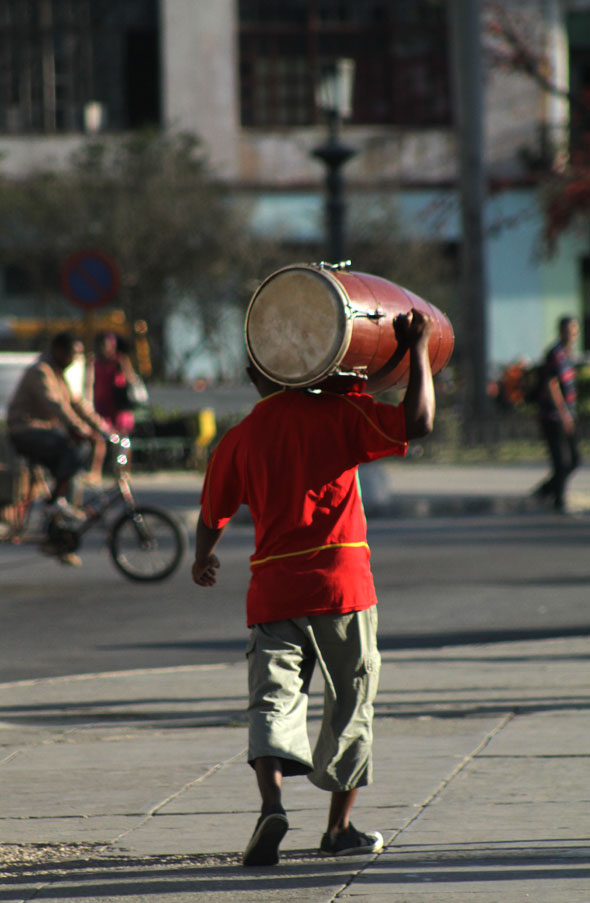
 After being closed for too many years, the door to self-employment has opened and you can see the activity on the streets of our towns and cities. The Cuban has always been an enterprising person with initiative. These aren’t unique qualities as many other people also have them. Because of this, however, Cubans were able to take a country devastated by the wars of independence into a republic and a prosperous nation in the historically short space of 56 years, despite political tensions, violent clashes, a banking crash and two dictatorships, placing it in the top ranks globally with regards to health, education, social and labor security, culture, sports, urban development, transport and agricultural and industrial production, which can be easily proven by browsing historic documents and letters.
After being closed for too many years, the door to self-employment has opened and you can see the activity on the streets of our towns and cities. The Cuban has always been an enterprising person with initiative. These aren’t unique qualities as many other people also have them. Because of this, however, Cubans were able to take a country devastated by the wars of independence into a republic and a prosperous nation in the historically short space of 56 years, despite political tensions, violent clashes, a banking crash and two dictatorships, placing it in the top ranks globally with regards to health, education, social and labor security, culture, sports, urban development, transport and agricultural and industrial production, which can be easily proven by browsing historic documents and letters.
Starting from the early sixties, private initiative was suppressed by absurd laws, decrees and regulations, and everything began to be considered and decided at the highest level of government, implanting the inertia and stagnation which brought with it, as a consequence, a profound and accelerated process of involution, partially mitigated for over thirty years by the millions in subsidies received from the extinct Soviet Union and other socialist nations, but in the end leading to the current crisis and misery, where agriculture and industry have disappeared, more than 80% of what is consumed is imported, there no longer being producers of sugar, coffee, and other items.
The other side of the coin is the city of Miami and the Florida peninsula where, before 1959, it was mainly a resort of bored elderly, and otherwise an area of swamps and crocodiles, but today, thanks mainly to the initiative and entrepreneurial spirit of Cuban immigrants, it has become a crowded modern city, one of the richest in the United States.
The initiative and entrepreneurial character came to us from our roots, of those immigrants who came as employees of businesses and farmers and, in a few years, working with determination, themselves became owners of the same, making Cuban families.
It would be healthy if the open door was opened to all, and if private initiative and the entrepreneurial character of our citizens was not restrained. This would, despite the many limitations that still exist, breathe a little life into the Cuban reality and we could begin to emerge from the abyss in which we find ourselves.
March 2 2011
When resorting to physical blows, this displays a degree of errors in intelligence and professionalism. Many times, fear makes people lose their wits.
It seems as if this is what happened to officials of the political police. That night, they went to go look for me at the cells of the Aguilera Unit, in the 10th of October municipality. They had arrested me during the morning hours as I was leaving the home of the distinguished civil leader, Eriberto Liranza Romero, where we had just held an important meeting for the Orlando Zapata Tamayo National Civic Resistance and Disobedience Front. In that encounter, activists representing multiple organizations throughout the Western region of the country were present.
“Antunez,” they told me, after identifying themselves as high ranking officials from the popular Section 21, also known as the National Headquarters of the Confrontation Unit, “we are going to talk clearly to you. That Front which you now lead will simply not be permitted in Havana. And I’ll tell you more. Due to activities like the ones you are carrying out, our Revolution has been losing allies that were slowly dropping their hostile positions against us,” and he continued, “And that will simply not be allowed. You are scratching our limit, and at any given moment, the leaders of our Revolution will order your imprisonment.”
“Don’t think for a moment,” the stupid major named Ignacio continued, “that because we are releasing prisoners we will cease condemning counter-revolutionaries.”
I remembered the time when Colonel Tamayo told me, “Antunez, you should know that whenever we unleash another operation, which you all refer to as repressive waves, you will be one of the first to be imprisoned, and with the longest sentence.”
Although the interrogation was ingenuous, it still was very interesting, for it acknowledged that the struggle which irritates them the most is that which is carried out through public protests and actions. They also let me know that the Front has kept them very nervous, and that they do not have the most minimal of desires to cease oppressing any dissenting voices. And that is why we will continue in the streets, because the streets belong to the people, and the government has tried, and continues to try, to steal them from us.
Translator’s note: “G2” is the designation for Cuban State Security, “G21” is specifically the Confrontation Unit.
Translated by Raul G.
We received the call precisely when we were concluding the Central Opposition Coalition reunion and were displaying our unconditional support of our leader, Idania Yanez Contreras.
“They released Carlos, but they don’t want to give him back his daughter, Yili.”
“They have to give her back! They’ve made them suffer far too much already,” my wife Yris exclaimed, full of tears and clearly bothered.
“Let’s go to Los Arabos,” Idania and Yris exclaimed in unison.
“What a mess. Now how are we supposed to do this? We barely have the necessary resources for so many of us to go out, and the only one who can transport us in his car only has room for 6. And there are almost 20 of us!”
Everybody wanted to go.

Alcides, Idania, Yris, Adriano, Columbie, Francisco, and I all hopped into the car, where we were only able to get as far as Santa Clara, for there was a strong police operation underway. Those of us who went were strategically chosen due to our individual representation of the provinces which took part in the event: Matanzas, Sancti Spiritus, Ciego de Avila, and Villa Clara. Our brother, Tur Valladares from Cienfuegos, could not join us due to health reasons.
Along with the cold which chilled our bones in Santa Clara, we were joined by Guillermo, Frank, and Carlitos. In the railroad terminal for Colon, we were also joined by Joseito and Carlos himself, and we traveled to Colon, where the same police operation was taking place.
They did not want to give him his daughter back until he pulled out his ID Card. This was a condition the father did not accept.
With a hunger strike, along with our support and the support of other compatriots — the Lady in White Alejandrina Garcia, Lazarito, and Cari — there were more than 20 of us in that display of solidarity.
Three hours had not even passed when State Security major Alejandro knocked on the door to tell Carlos to go to Los Arabos to pick up his daughter. Yris, Idania, and Alejandrina all accompanied him, and they were all witnesses of that emotional moment where a desperate father once again embraced his daughter after 4 months of absence and separation. The young child had scars on her face.
That moving scene put an end to the “Return Yili to her Father” campaign, which had been launched by the Rosa Parks Feminist Movement for Civil Rights and counted with the support of many Cubans in and out of the island which joined in solidarity through this unforgettable drama.
That is the Coalition, that is unity, and those are the results. And that is our response to those who, for matters of greed and other grave reasons, never cease to attack us.
Translated by Raul G.
December 28, 2010
 Once again I’ve seen how public opinion can be conditioned just by preparing a group of people and putting a camera in front of them. I won’t question the sincerity and good faith of those who agreed to give their opinions, but in Cuba there is a tendency to say on camera what one is expected to say and not what one really thinks. In this case, it has to do with neighbors from the district of El Vedado who gathered to see the last episode of the series The Reasons of Cuba.
Once again I’ve seen how public opinion can be conditioned just by preparing a group of people and putting a camera in front of them. I won’t question the sincerity and good faith of those who agreed to give their opinions, but in Cuba there is a tendency to say on camera what one is expected to say and not what one really thinks. In this case, it has to do with neighbors from the district of El Vedado who gathered to see the last episode of the series The Reasons of Cuba.
The first interviewee caught my attention, Thalia Fung, a name that means nothing for most viewers, but who is a Doctor of Marxist Philosophy with a professorship at the University of Havana. Others gathered in the living room of the spacious apartment are also interviewed, even a teenager like my son, of the three that could be seen in the report. They ended with the opinion of a lady absolutely convinced by the arguments expressed in this television show.
This journalistic work prepared as a special report for Noticiero sets the tone of political correctness. I still wonder when they will accept the reality that individuals can have different opinions, that it is necessary for our society to recognize that the double standard can only lead to a worsening situation, that in spite of all the secret and public mechanisms, the government still has no idea of what the people who shout and applaud when they are standing in front of a camera, actually think.
Translated by Dodi 2.0
March 2 2011